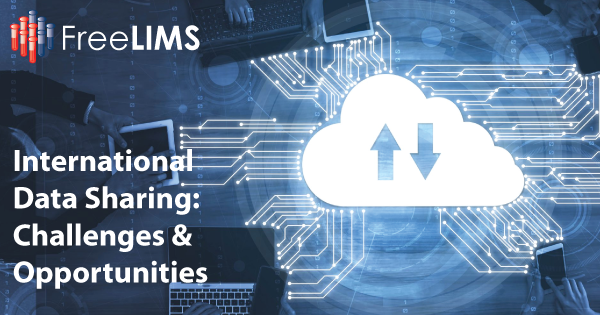In today’s interconnected world, data sharing has become an essential component of scientific research and collaboration. In the field of biobanking, where vast amounts of biological samples and associated data are stored for research purposes, the need for efficient and secure international data sharing has gained significant prominence.
The emergence of cloud computing technology has created new opportunities for biobanks to collaborate and exchange data across borders, enabling unprecedented advancements in biomedical research. However, with these opportunities come unique challenges that must be addressed to ensure the ethical, legal, and secure exchange of data.
This blog post discusses the difficulties and possibilities that arise from international data sharing over the cloud and examines the potential impact on biobanks.
Data Privacy and Security Concerns
One of the primary challenges in international data sharing is ensuring data privacy and security. Biobanks must comply with diverse legal frameworks and regulations governing data protection, which can vary significantly across different countries. For example, the data sharing policy of the Tohoku Medical Megabank (TMM) emphasizes privacy protection and incorporates comprehensive measures to prevent privacy violations in the course of international data use and sharing. This policy includes the implementation of physical, personnel, and technological safeguards to ensure data privacy and draws inspiration from the policies of renowned institutions such as the National Center for Biotechnology Information (NCBI) and the Sanger Institute. By adopting such a policy, TMM aims to strike a balance between enabling data sharing for research purposes while safeguarding the privacy and confidentiality of individuals’ data.
Ethical and Legal Considerations
International data sharing requires navigating complex ethical and legal landscapes . Respecting cultural sensitivities, addressing concerns related to informed consent and data ownership, and complying with international regulations pose significant challenges. Biobanks must establish robust governance frameworks, ethical review processes, and legal agreements to protect the rights and privacy of research participants while facilitating responsible and transparent data sharing.
Lack of Equitability in Benefit Sharing and Data Access
In this article titled “A call for global governance of biobanks,” the author introduces a significant risk in international data sharing as low- and middle-income countries (LMICs) join the ranks of high-income countries in establishing their own biobanks. However, LMICs often lack comprehensive legislative structures and governance frameworks to safeguard the rights and interests of research participants and communities. In response, international collaborations are emerging to support the establishment and proper operation of biobanks in low- and middle-income countries. Such collaborations can introduce cross-border challenges, including benefit sharing and data access.
It is imperative to define and implement a fair, equitable, and feasible biobank governance framework that ensures a balanced distribution of risks and benefits among all stakeholders involved. Such a framework will promote responsible biobanking practices and foster global collaboration in an ethically sound manner.
Opportunities for Over the Cloud Data Sharing
Despite the challenges, international data sharing over the cloud opens up opportunities for breakthrough discoveries and transformative research. Large-scale, multinational studies become feasible, enabling the identification of rare diseases, biomarkers, and genetic variations that may have been otherwise challenging to uncover. The pooling of resources, expertise, and data allows for more comprehensive analysis and a deeper understanding of complex biological processes.
Leveraging Cloud-Hosted Biospecimen Management Software To Overcome Challenges
Cloud-based Laboratory Information Management Systems (LIMS) play a crucial role in supporting biobanks in international data sharing over the cloud. A LIMS, also known as biospecimen management software, provides a centralized platform for managing and organizing vast amounts of data associated with biological samples stored in biobanks. Implementing cloud-based biospecimen management software enables seamless access and secure sharing of data across international borders. Biospecimen management software facilitates data standardization, ensuring that data from different biobanks can be easily integrated and analyzed.
A cloud-hosted LIMS offers robust data security measures, including encryption, access controls, and audit trails, to protect sensitive information during the data-sharing process. With its data management capabilities, LIMS enhances the efficiency, reliability, and traceability of data exchange, enabling biobanks to collaborate effectively and contribute to global research endeavors.
The Promise of International Data Sharing
International data sharing over the cloud presents both challenges and opportunities for biobanks. It is important to ensure data privacy and security, and follow ethical and regulatory guidelines for cross-border data sharing. By addressing these challenges through the development of standardized practices, robust governance frameworks, and leveraging a cloud-hosted biobanking LIMS, biobanks can harness the power of international data sharing.
International data sharing through cloud-based tools offers biobanks the potential to accelerate scientific discovery and maximize research outcomes. By pooling resources and sharing diverse datasets from various geographical locations, researchers can gain access to larger sample sizes and diverse datasets, leading to more robust and generalizable findings. This will, in turn, revolutionize the field of biomedical research and ultimately improve human health on a global scale.


